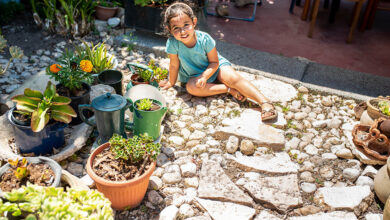
How to Prevent Garden Pests from Ruining Your Garden
- 1. Understand the moisture needs for your plants
- 2. Plant pest-resistant vegetables
- 3. Encourage insects that feed on pests
- 4. Use herbs
- 5. Physical barriers
- 6. Spraying synthetics
- 7. Make your soil healthy
- 8. Alternating crops
- 9. Crop rotation
- 10. Removing infested plants
The dream of every gardener is to have a beautiful and healthy garden. However, sometimes bugs and pests can infest your garden and rein havoc all over the place.
If your garden has been infested, the best thing to do is to try and rid it of pests.
If it isn’t infested, then you need to put measures in place that will prevent the pests from making your garden their home.
Here are 10 ways of preventing garden pests from ruining your garden:
1. Understand the moisture needs for your plants
Some plants do well under the sun, others don’t.
If your garden is filled with plants that need lots of water to grow and remain healthy, depriving them of water will leave them vulnerable to pests.
You will need to understand how much water each plant needs in order to survive pest infestation.
If you live in a very warm neighborhood, it would be wise if you invest in a good lawn irrigation system that will keep your plants moist at all times.
2. Plant pest-resistant vegetables
Some plant species are more prone to pest damage than others.
If beetles are reigning havoc in your potato garden, maybe you will get better results by planting another potato species such as King Harry’ potato. This strategy is applicable across the board.
If your garden is infested by tomato hornworms, then you can opt to plant vegetables that aren’t part of the tomato family.
Plants such as pepper, eggplant, and potatoes will be very vulnerable if you insist on having them in your garden.
3. Encourage insects that feed on pests
Bugs such as damsel, minute pirates, and ladybugs feed on small insects that destroy your plants.
Lacewings and parasite wasps are also great insects to have in your garden because they feed mites, hornworms, slugs, and snails to their babies. Spiders, on the other hand, feed on caterpillars and their eggs.
Growing flowers in your garden will attract pollinators who also feed on pests.
Making permanent pathways also encourages beneficial insects to build permanent habitats without being disturbed every time you till the garden.
The bottom line here is to provide these predatory insects with the right habitat to lay their eggs and multiply.
4. Use herbs
Planting scented perennial herbs such as calendula, garlic, anise hyssop, chives, and coriander will keep pests at bay.
Simply add a line of the herbs around the vegetable garden and their scent will automatically send the pests packing.
5. Physical barriers
Laying a lightweight fabric at the base of each one of your plants will block pests from accessing the lower and most vulnerable parts of your plants.
A copper ring would also serve this purpose as slugs and snails cannot bypass them.
6. Spraying synthetics
If organic pest control methods are failing you, consider spraying synthetics to your garden.
This method is easy and fast because all you need to do is purchase synthetics over the counter, dilute them with water, and spray.
However, synthetics can pose great harm to your little ones, rabbit pets, and the beneficial insects we talked about earlier.
7. Make your soil healthy
A healthy garden means healthy plants, which also means that the plants are able to fight off diseases and pest invasion better and faster.
But that is not all; soil microbes that reside in healthy soil are, by themselves, pest repellent.
Note that your soil will get healthier if you lay down enough organic matter and fertilizers.
8. Alternating crops
Alternating crops- better known as inter-planting, break the crop monotony that pests thrive under.
You can also mix different crops within a small area to confuse pests. Pests that feed on cabbages, for example, would get confused if you planted onions together with the cabbages.
And like we mentioned, you can always inter-plant your vegetables with pest-repelling herbs and flowers.
9. Crop rotation
Building on the point above, rotating your crops on an annual basis disorients the pests and prevents them from getting too comfortable in your garden.
Interchange crops of the same family over a period of 3-4 years and then stop planting them for another 5 years or more.
However, if crops in a given family are appearing to be too vulnerable to pests even before the 3-year window closes, go ahead and replace them with crops from a different family.
10. Removing infested plants
When you start noticing bugs in your garden, it is important to uproot the most affected plants in order to stop any potential spreading to the healthy plants.






